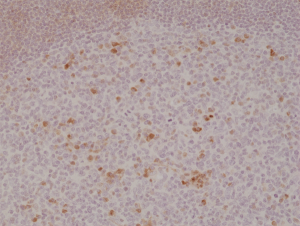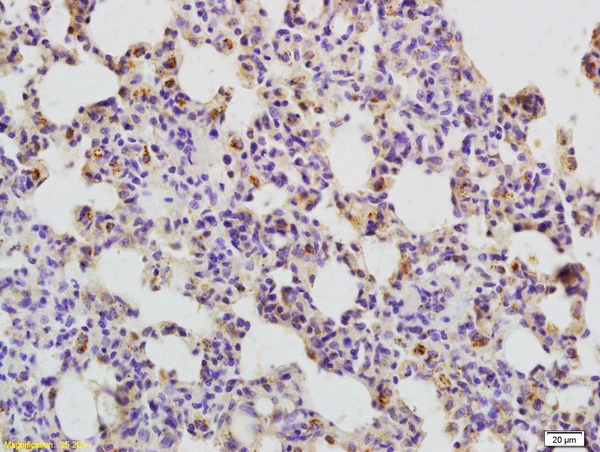Anti-CD134 [A10-F]
AB02228-3.3-BT
ApplicationsFlow Cytometry, ELISA, Neutralisation/Blocking
Product group Antibodies
ReactivityHuman, Monkey, Primate
TargetTNFRSF4
Overview
- SupplierAbsolute Antibody
- Product NameAnti-CD134 [A10-F]
- Delivery Days Customer9
- Application Supplier NoteThis antagonist antibody is a humanized version of the original murine parent antibody A10. The binding specificity of this antibody to OX40 was determined by ELISA and flow cytometric techniques. Naive CD4+ T-cell assay was used to test the ability to inhibit cytokine production, proliferation, and to induce apoptosis in human CD4+ T-cells. A10-F inhibited cytokine release (IL-2/IL-5/IL-13) and CD4+ T-cells proliferation to the same level as its murine parent. A10-F was also tested for its antagonistic activities like inhibiting the proliferation and cytokine release of Th1 primed T-cells, Th2 primed T-cells and Th17 cells in the presence of irradiated OX40L transfected L-cells or parental L-cells. Under Th1 conditions, A10-F inhibited the production of IL-2, IL-5, IL-13 cytokines and cell proliferation. Under Th2 conditions, A10-F showed an antagonistic effect on activated CD4+ T-cells by inhibiting their proliferation and cytokine release (IL-2, IL-5, and IL-13). With Th17 cells, A10-F increased apoptosis in a dose dependent manner. Cell proliferation and cytokine production in Th2 cells primed with TSLP-activated myeloid CD11c+ dendritic cells (DCs) was inhibited in the presence of A10-F. It also further caused significant increase in apoptosis and a lower expression of Survivin. A10-F was also tested for its antagonistic activities and the ability to inhibit the proliferation and cytokine production of Th1 primed T-cells in the presence of LPS-activated DCs. Here also A10-F inhibited the IL-2, IFN-gamma, and TNF-alpha cytokines production and cell proliferation (US20100136030).
- ApplicationsFlow Cytometry, ELISA, Neutralisation/Blocking
- CertificationResearch Use Only
- ClonalityMonoclonal
- Clone IDA10-F
- Gene ID7293
- Target nameTNFRSF4
- Target descriptionTNF receptor superfamily member 4
- Target synonymsACT35, CD134, IMD16, OX40, TXGP1L, tumor necrosis factor receptor superfamily member 4, ACT35 antigen, ATC35 antigen, CD134 antigen, OX40 antigen, OX40 cell surface antigen, OX40 homologue, OX40L receptor, TAX transcriptionally-activated glycoprotein 1 receptor, lymphoid activation antigene ACT35, tax-transcriptionally activated glycoprotein 1 receptor
- HostMouse
- IsotypeIgG2b
- Protein IDP43489
- Protein NameTumor necrosis factor receptor superfamily member 4
- Scientific DescriptionThis chimeric mouse antibody was made using the variable domain sequences of the original Human IgG1 format, for improved compatibility with existing reagents, assays and techniques.
- ReactivityHuman, Monkey, Primate
- Storage Instruction-20°C,2°C to 8°C
- UNSPSC41116161







